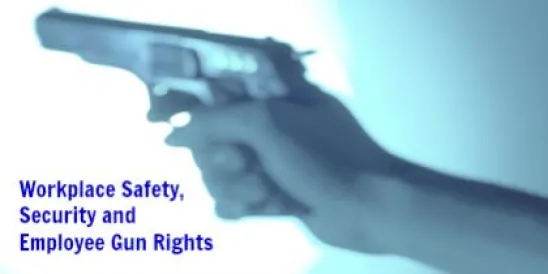Under the Safe Carry Protection Act of 2014, government buildings, schools, churches, and bars are no long excluded from the list of places where licensed persons may legally carry firearms. Signed on April 23, 2014, by Georgia Governor Nathan Deal, the new law, House Bill 60 (also known as the “Guns Everywhere Bill”), goes into effect July 1, 2014.
Despite the new law, Georgia employers still may prohibit possession of firearms on their premises as long as the employer is the property owner or has legal control of the property. The law does not restrict “property owners or persons in legal control of private property through a lease, rental agreement, licensing agreement, contract, or any other agreement to control access to the private property” — such persons may continue to bar firearms from their property.
In addition, employers who own their employee parking lots can exercise the rights of property owners. Under the 2008 “Parking Lot Bill,” any employer that owns property on which employees park their vehicles may restrict access to their property as a property owner. Such an employer also may search employees or guests in a lawful manner. Employers that do not own their employee parking lots may search employee vehicles for weapons under certain circumstances. Moreover, employers have the right to prohibit employees who have completed a disciplinary action, or have one pending, from bringing a concealed weapon onto company property.
Employers that do not own their employee parking lots may search the vehicles of employees for firearms under some circumstances, including:
(A) Where the vehicle is owned by the employer.
(B) Where a reasonable person would believe that searching the vehicle might prevent an immediate threat to human health, life or safety.
(C) Where a private security officer has probable cause to believe the employee unlawfully possesses employer property and the employee consents to a search of the vehicle.
Furthermore, searches may be made by law enforcement personnel pursuant to a valid search warrant or valid warrantless search.
In addition, employers that provide a secured parking area that restricts public access with a gate, security officers, or security guards may search employee vehicles as long as they search all vehicles.
The “Parking Lot Bill” does not apply to employers in certain sensitive industries: prisons, jails, or other detention facilities, public utilities, or Department of Defense contractors located on a U.S. military base or within one mile of an airport. Finally, parking lots near facilities involved in the storage or supply of water or energy, and deemed in writing to be vital to the State of Georgia by the Department of Homeland Security, also are not covered by the “Parking Lot Bill.”





 />i
/>i

